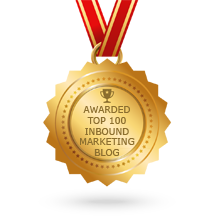
2017 has arrived and along with it has come the promise of some exciting new trends in the world of Inbound Marketing.
As we settle in and plan for the year ahead, now is the opportune time to assess the latest developments in Inbound Marketing and how they will impact you and your clients.
The increased need for smarketing, the rise of artificial intelligence (AI) and a surge towards video are amongst the top trends we predict will have the most impact in 2017.
Video Made the Marketing Star
According to HubSpot’s 2016 State of Inbound Marketing report, 48% of marketers are planning on increasing their YouTube presence and 39% are looking to use Facebook video in 2017. It’s not surprising when you consider that YouTube has now topped 1 billion users, and the number of channels generating six-figures has increased by 50% year on year. Meanwhile, the number of videos appearing in the typical user’s Facebook feed has increased by 360% over the past two years alone.
Video is arguably set to become the leading platform for businesses and brands to introduce themselves, spread their reach, grow an audience and attract new leads.
In fact, forecasts predict that video traffic will be 82 percent of all consumer internet traffic by 2020. Staggeringly, on current projections it would take a person more than 5 million years to watch all of the video content that will cross global IP networks each month in 2020.
2017 will be the year that Inbound Marketers up their game in preparation for the rise of video.

Smarketing: Marketing and Sales Sharing the Love
New South Wales vs Queensland. Carlton vs Collingwood. Australia vs England. Coke vs Pepsi. Microsoft vs Apple. Throughout history and across industries, there have always been great rivalries. In modern business, Marketing vs Sales has emerged as one of the most common ones. But that could be all about to change.
HubSpot, last year revealed the true impact of the misalignment between Marketing and Sales. It showed that just 22% of its State of Inbound respondents have a formal service level agreement between Marketing and Sales — yet 70% of those same respondents say that closing more deals is their top priority in 2017.
The statistics are telling:
- Misalignment between sales and marketing technologies and processes costs B2B companies 10% of revenue or more per year.
- Companies with good smarketing practices in place generated 208% more revenue from marketing efforts.
- When sales and marketing teams work together, companies see 36% higher customer retention and 38% higher sales win rates.
Expect Marketing and Sales to buddy-up in 2017 as more companies align the two in their quest for effective smarketing.
The Rise of Artificial Intelligence (AI) and Marketing
In 2017, AI will leap from the realm of science fiction and land in the world of marketing with a monumental thud.
A product of the age of big data, in its simplest form AI will allow marketers to automate processes and identify patterns and problems invisible to the human eye.
Using sophisticated natural language processing and ‘machine learning’, AI will revolutionise market segmentation, create highly personalised customer interactions and automate to a level of detail never before seen. In fact, AI is becoming so sophisticated that the days of manually analysing detailed reports could be numbered. Instead, AI will be able to independently produce recommendations to you based on the data it has assessed – all by itself.
“Massive amounts of data; exponential advancements in computing power; and the availability of AI technology from Facebook, Google, Microsoft, IBM and others have combined with a flood of venture capital money pouring into everything AI to prime the marketing industry for disruption,” says Paul Roetzer of the Marketing AI Institute. “Many tasks commonly performed by marketers are being augmented by machine learning, deep learning and cognitive computing.”
Furthermore, research released by DemandBase last month showed that 80% of marketing executives believe AI will revolutionise marketing over the next five years.
However, only 26% are very confident they understand how AI is used in marketing and only 10% of marketers are currently using AI today. That will change in 2017 as marketers move to get ahead of the curve and the imminent disruption AI is about to bring to the industry.



